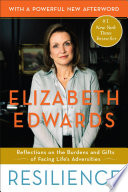If you read Elizabeth Edwards’ first book, Saving Graces: Finding Solace and Strength from Friends and Strangers, then the initial 132 pages of Resilience: Reflections on the Burdens and Gifts of Facing Life’s Adversities, her second book, will be repetitive. Resilience: Reflections on the Burdens and Gifts of Facing Life’s Adversities has a total of 237 pages. If I am being understanding, I think that she covers familiar ground because it entails the defining aspects of her life: her father’s illness, which gets more coverage in this book and is only alluded to in the first book, and the death of her eldest. Because I read the two books with no intermission, I audibly groaned at the beginning. I don’t mind dwelling on morbid subject matters. I read books on pandemics, huge historical and intimate personal tragedies all the time, but she is stuck. Part of this morass is understandable. By struggling with their death, she was struggling with her mortality. Reading Resilience: Reflections on the Burdens and Gifts of Facing Life’s Adversities is like going through the stages of grief with Elizabeth Edwards. You can actually see her grappling with the new reality of her life-her impending mortality and the impending end of her marriage. Initially she barely wants to admit what is happening and only alludes to it as an indiscretion. She focuses her ire on the unnamed other woman and repetitively derides her come on, “You are so sexy.” She never admits to herself that this other woman was probably not the ONLY woman. She admits that her earlier life before her son died was viewed through rose-colored glasses. In her first and second book, she recalls dance and music lessons from a young, elegant Japanese woman who was going to be a geisha until she was injured by Hiroshima. In neither book does Edwards question whether or not she wanted to be a geisha–was she a willing sex worker or an exploited young woman. Much of her life in the first book and the first half of the second book are like this. She does not look below surface ideals until the second half of the book. By page 133, Edwards gives us new information. By page 169, she is willing to write about the subject that probably made this book a #1 New York Times Bestseller: her husband’s infidelity. By page 179, she is willing to look at her mother’s story and at the less idyllic aspects of her childhood. In the majority of the second half of the book, she believes that they can get past it and stay together. By page 202, she finally wants to be whomever she is, to create an independent identity. By the last chapter, the marriage is over. It is interesting that it is only in this second book that Edwards discusses her husband for the majority of the book-often fondly and briefly sexually (he accidentally brushed her boob before he asked her out on their first date; a very different story from the first book AND NO HE DIDN’T DO IT ACCIDENTALLY). Please note, that I am making Resilience: Reflections on the Burdens and Gifts of Facing Life’s Adversities more interesting than it is. Resilience: Reflections on the Burdens and Gifts of Facing Life’s Adversities is a raw emotional journey, but not necessarily a good read even for the curious.

Resilience: Reflections on the Burdens and Gifts of Facing Life’s Adversities
Stay In The Know
Join my mailing list to get updates about recent reviews, upcoming speaking engagements, and film news.




